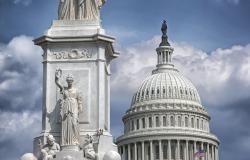What Has Happened? A Comment on the True State of American Democracy in 2021

Scott Montgomery puts America's recent troubles in historical perspective and argues that there is a long road ahead with few guarantees that current trends will be reversed.
By any measure, it has not been a happy start to the New Year for American democracy. I don’t wish to be overly pessimistic, but the country has revealed itself to be in an astonishing state. In truth, however, it has been this way for some time.
The weakening of America’s democratic order, after all, has come not merely from Trump and those loyalists who invaded the Capitol Building on Jan. 6. It has been ongoing from a Republican Party that has backed and enabled this president from the beginning, and that supplied over 145 members of Congress to argue for overturning the election on the very same day as the Capitol assault. Those GOP leaders, such as Messrs. McConnell, Graham, and Cotton, who expressed their shock and horror at the attack would be loath to admit any responsibility. They have long learned to deflect the terrors of the mirror.
A Plague of Madness?
Be that as it may, there is one other protagonist who deserves mention. Tens of millions of Americans, some who may not have favored the rioters’ methods, fervently agreed with their purpose. As stated by Trump himself during the Capitol attack: “These are the things…that happen when a sacred landslide election victory is so unceremoniously and viciously stripped away from great patriots…Remember this day forever!.”
It is unlikely to be forgotten. On the one hand, it will stand like the Oklahoma City bombing, Watergate, and the March on Selma, and for some of the same reasons. But at the same time, it will be held in mind by those on the far right as a heroic and necessary attempt. Regret may be felt that materials were smashed and stolen, and that blood and feces were smeared on statues and walls. Yet, such must be seen as the detonated passion of true patriots, whose excesses are the measure of oppression by liberal socialist elites. Indeed, more must be done: the rage of symbols and the angry vandalism—even the death of Ashlii Babbitt, shot by police as she forced her way through a smashed window into the building—are being legitimately used now to recruit more “freedom fighters” for future events, which may not be long in coming.
These will be added not to a smattering of fringe groups, meeting in steel-clad safe rooms. Those who marched on the Capitol included local lawmakers, veterans, lawyers, law enforcement officers (not in uniform), nurses, teachers, evangelicals, unemployed construction workers, hair-dressers, pool cleaners, and more—people from every level of society, mostly white and male but also women and some minorities. Calling them “extremists” one and all leaves one in a difficult and terrifying position: these people, and the tens of millions behind them, comprise a major slice of America itself.
In truth, far too much credit is given Trump and his disastrous four years in office. Perhaps his unrelieved brutality and the sight of white supremacists carrying the Confederate flag in a marmoreal temple of democracy has swept away remembrance of other things past—the crude and conspiracy-driven attacks on Obama during his entire eight years in office, for example, endlessly invoked by the GOP. And before this, the astounding hatred devoted to the Clintons a decade earlier, as well as the at FBI after the Waco siege in 1993. A year later, far right conservatives led by Newt Gingrich took over Congress, declaring “politics is war” and bringing to an ugly end the tradition of bipartisanship. Trump is accountable for innumerable corruptions of office, and pursuing him legally, with conviction, is needed. But unless the military is involved, power must be given before it can be abused. Donald Trump is not the origin of America’s problems.
The pandemic has been revealing here. Huge numbers of Americans, even in the midst of a surge in cases, continue to reject measures for controlling the virus, like wearing masks. Millions say the threat is exaggerated, a plot to enfeeble the public, and will refuse any vaccine. Health experts tasked with giving advice to slow the pandemic are widely harassed and threatened, while health care workers, first in line for vaccination yet swayed by conspiracy ideas, reject the shots, in effect disavowing their qualifications for care. All while more than 21 million Americans have contracted covid-19 and 375,000 have died--a figure greater than all Americans in the army and air force killed in WWII, fighting to save “the free world.”
All indications are that as much as a third of the American public continues to deny both the results of the November election and the threat of the pandemic. One must be forgiven for concluding that the longest surviving liberal democracy of modern times has also been struck by a plague of madness nearly as contagious as the covid virus.
Burning the City on a Hill
What, then, is the true state of our democracy? Three points must be made. First, as noted, Trump should be understood as an accelerant and icon of what has occurred. He did not create the millions that elected him in 2016, then cultified him as savior. He certainly didn’t birth the reactionary evangelical Christians that support him either. They were lovingly brought into the Republican fold by Ronald Reagan in the late 1970s, and thereafter developed what has been called “a pretty big fringe.” Well before Trump, the reactionary right had learned to hate liberals and Democrats as answerable for the injustices and insults plaguing the nation, from economic woes to the “flood” of illegal immigrants, attacks on white Christianity to elite ridicule of “ordinary Americans,” dissolving of “family values” to socialist hatred of America itself. Taken as a whole, reactionary conservatism has grown over the past four decades from a relatively marginal brook of U.S. political culture into a massive current of the mainstream, urged by a GOP that abandoned traditional conservative ideas for skilled strategies of fear, threat, and anti-science. So extreme has the party become that research on global populism places it shoulder-to-shoulder with India’s BJP, the Golden Dawn of Greece, and Israel’s Likud parties.
Second, the far-right portion of public, now numbering perhaps 40 or more, has increasingly gained backing and energy from a rightwing media universe trafficking in disinformation, conspiracy theories, rumors, and an immense volume of angry commentary. Much focus has been given to this universe and its weaponization. Studies like Network Propaganda by Yochai Benkler and coauthors, reveal how insular and extreme these media have become, from talk radio and cable news to social media. These sources are strikingly insular; they do not interact with any mainstream news sites and thus form a self-reinforcing cybersphere of rant and rage. It is also a highly dynamic and adaptable space. Twitter, Facebook, and Instagram may eventually ban all such content (or not), but newer sites and platforms like MeWe, Rumble, and Gab, with little monitoring of content, are fast becoming favored places. Recent moves by Amazon, Apple, and Google to expel Parler, a site recently used by extremists to plan possibly violent protests, will make little difference. It has since found a new host, especially favorable to the far right. Attempts at “suppressing” it will almost certainly make it more popular. But even if it died, something new would takes its place. Such is the reality going forward.
Third, recent events will decidedly have lasting impacts, not only for the U.S. but for liberal democracy worldwide. Massive delight and ammunition have been given to democracy’s enemies, while America’s allies express alarm at how liberalism has been made to look weak and self-destructive. China, Russia, Iran, and North Korea find in America’s breakdown a beacon for their despotisms. Putin and Xi have much new legitimacy to claim, “This is what you get with democracy, chaos.” But still more, as put by members of Putin’s circle, “America no longer charts the course and has lost all right to set it,” and “[it] cannot now impose its electoral standards and other countries.” Such are likely to be hyperbolic statements. Bad as it was, physically and symbolically, the Capitol assault had no effect on the confirmation of Biden as president-elect. News of democracy’s death in the U.S. has been greatly exaggerated. Weakened, however, it is. The Russians might instead celebrate the evident fact that no cyberattack from their own hands is likely to achieve what Americans have done to themselves, at home and in the eyes of the greater world. It was not only the Capitol that suffered assault on Jan. 6, but the City on a Hill.
Finally, any talk about “healing” is (to put it diplomatically) unhelpful to the truth. What America needs more of is dry-eyed realism, not anodyne fantasy. The country is broken, with ragged edges. And the shattering is not new. Fervidly claiming “this is not who we are!” may sound proud in decibels, but it rings as hollow as an empty hand. A large part of the American public has been profoundly radicalized, to the point of inhabiting an angry, bitter, and alienated reality, daily enforced by online sources this population avidly consumes. If the Trump era has revealed anything, it is that the GOP no longer controls these millions and their view of the country. Republican leaders, including Vice President Pence and Senate Majority Leader Mitch McConnell, are now targets of abuse for having recognized Biden’s victory and refusing to help overturn the election. It has become a clear case of Rosemary’s Baby Syndrome. An earlier symptom of this was the Tea Party, which infected the body GOP after the Great Recession; yet these were almost purely fiscal tremors that have since subsided with Republican support for stimulus during the pandemic. In 2021, the attack on government is more political and cultural than economic. This makes it more radical on more levels and more capable of violence than anything the Tea Partiers wished for.
Not Trump’s Party
It has to be said that the radicalized, reactionary population represents a standing threat to the country’s future. Dissolving its violent intransigence will take time and help from the Republican Party, its nursemaid, which shows few collective signs of doing so. The much-hailed “split” in the party, after all, was proven an utter myth by results of the Second Impeachment of Mr. Trump—10 House Republicans for, 197 against. This, again, does not make it “Trump’s party,” a misperception. Such numbers merely show that the 197 know who butters their political bread.
Trump himself will not go gentle out of any spotlight but will find ways to continue feeding the fears and anxieties of the millions who love him, yet, should he dissolve like a wicked witch, would hardly abandon their eruptive political and social ground.
The events of January 6, 2021 should be understood neither as a “shocking tragedy” nor a “wake up call.” They are part of an ongoing struggle that reactionary ideas and tactics set in motion some time ago. Father Coughlin, a forerunner of Trump, drew a vast audience during the Great Depression to his radio rants about the evils of liberal government and the menace of certain minorities (Jews, at that time). Had he not been shut down, his program cancelled by FDR after the outbreak of WWII, the U.S., with its millions of fascist sympathizers, would likely still have united in wartime. Without the war, however, a very different country might have emerged, as Phillip Roth’s novel, The Plot Against America, suggests.
Today’s reactionary millions are not fascist, yet they are no more friendly than Coughlin’s followers to ideas like equality, tolerance, openness, or the pursuit of happiness by those of different color and origins. It is disturbing, at the least, to think that another major war may be needed to alter things. Yet the historical truth is that the U.S. faces an evolving peril that has no guarantee of a positive end. We must hope it is a peril that will be faced by both political parties together.
Scott L. Montgomery, University of Washington.


